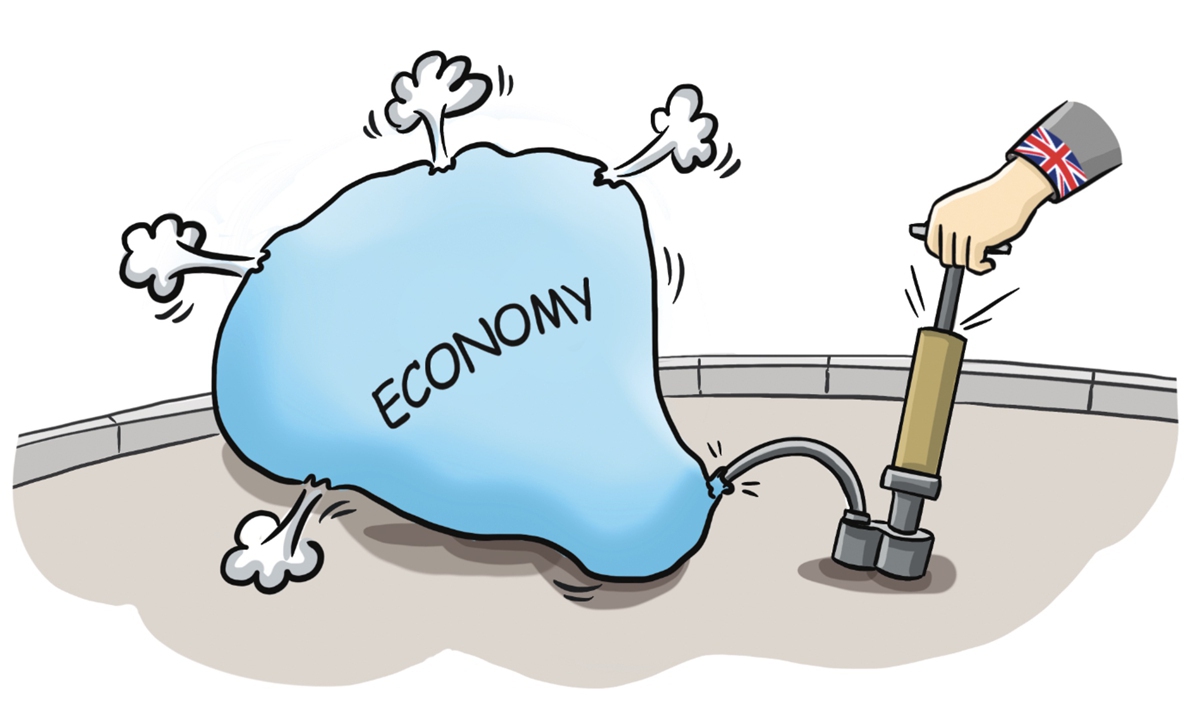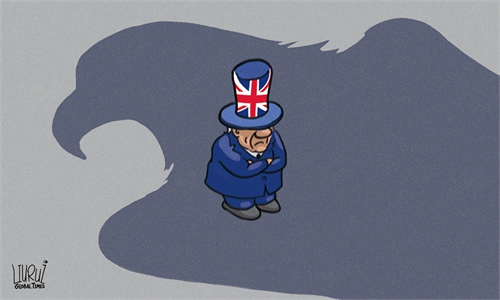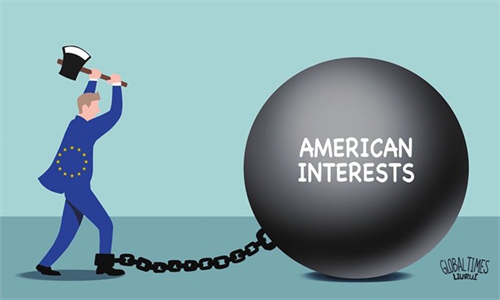
Illustration: Xia Qing/GT
The monetary tightening by the European Central Bank and the Bank of England will continue to weigh on Europe and UK's economies that now teeter on the verge of contraction. The latest statistics show the GDP of the EU fell into a technical recession, while the UK's economy eked out a paltry 0.1 percent growth.The International Monetary Fund earlier predicted the UK economy will shrink this year, and it is not surprising the outlook for both EU and the UK is bleak given the rising global uncertainties, including the Ukraine-Russia conflict, the lingering aftermath of the pandemic and soaring costs of both energy and food.
The deterioration of finances in many EU countries as well as UK will continue to hamstring economic recovery there, and the economies will contract further over the rest of this year in swaths of Europe. Germany, the Netherlands, Ireland and Greece are among the EU economies that reported an economic quarter-on-quarter contraction in the first quarter.
The UK economy is struggling which many Britons are feeling in their pockets, as their wages fail to keep up with persistently high inflation. Figures from the Organization of Economic Cooperation and Development (OECD), which looks at how developed countries are performing, show the UK economy fell further than others. And the UK's pace of recovery was not fast post-pandemic to make up the lost ground during pandemic.
As the largest economy in Europe, persistent consumer price hikes have helped Germany slip into recession in the first three months this year. Berlin's hardline policy to strictly restrict Russian imports has had an adverse effect.
Germany economy is badly affected when Russian gas supplies dried up after the breakout of Ukraine-Russia military conflict in early 2022.
German economy contracted 0.3 percent in the first quarter this year, which followed a 0.5 percent contraction in the final three quarters last year. Under the weight of immense inflation, the German consumers have fallen to their knees, dragging the entire economy down.
German inflation rate hovered at 7.2 percent in April, which is lower than the UK's inflation rate of 8.7 percent. Subsequently, higher prices have weighed on household spending on all items of commodities such as food, energy, clothing, furniture, electric appliances and cars. The persistence or stubbornness of high price increases has burdened on the economy.
Originally, economists estimated zero growth for Germany in the first quarter, suggesting Germany might be able to sidestep a recession. However, German household spending was particularly pummeled during the first three months, decreasing 1.2 percent than the previous quarter. Now, indicators suggest that things will continue to be similarly weak in the second and third quarters.
Earlier, the IMF predicted that Germany will be one of the weakest of the world's major economies, shrinking 0.1 percent in 2023. The lackluster economic environment is thought to pose more challenges for the European Central Bank to continue to tighten policies, which has been on a hawkish path for the last 12 months and most recently set its main rate level at 3.25 percent.
With regard to the UK's economy, it is widely believed that Brexit or its divorce from the EU will continue to have a lasting negative effect curtailing its development, which British politicians are reluctant to acknowledge. There is mounting evidences indicating that Brexit is contributing to inflation and prompting jobs and investments to migrate overseas.
The country's Office for Budget Responsibility has estimated that Brexit is costing the UK economy approximately $120-$140 billion every year, and the economy is about 4-5 percent smaller than it might have been if the country had stayed in the EU bloc. Divorce from the EU has made the UK's trade with that grouping of relatively rich countries a lot more difficult, and the move backfired on the economy.
As the UK pulled out of EU's single market and customs union three years ago, companies trading with the EU have faced new regulations, new paperwork and new checks on imported goods. When the British Chambers of Commerce surveyed 500 UK firms recently, more than half of them said they were still grappling with the new system.
And, business investment has generally stagnated since the referendum vote in 2016 - another drag on the UK's growth. Also, the EU workers used to come freely to work in the UK but can no longer do so, making it hard for the catering, hospitality and agriculture sectors to find enough hands.
A study by the think tanks Centre for European Reform and UK in a Changing Europe suggests that there are 330,000 fewer workers in the UK as a result of Brexit. That may only be 1% of the total workforce - but sectors such as transport, hospitality and retail have been particularly hard hit. Meanwhile, in the financial services sector, 8,000 jobs may have been lost.
There are also more fundamental reasons behind the UK's feebler economic performance. While the economy has slowed since the global financial crisis in 2008, the roots of the problems go back much further, with investment in decline ever since the 1990s, which causes long-term under investment, in both private and public sector, and degradation of public services and infrastructure in the UK.
Now, businesses are largely wary of the outlook for the UK economy and that will leave the economy lacking the resilience to cope with the triple shocks of the pandemic fallouts, Brexit and the deepening Ukraine crisis.
The author is an editor with the Global Times. bizopinion@globaltimes.com.cn



